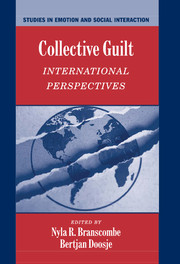Book contents
- Frontmatter
- Contents
- Preface
- List of Contributors
- Collective Guilt
- Section 1 Defining the nature of collective guilt
- Section 2 The Relationship Between Group Identification and Collective Guilt
- 6 Consequences of National Ingroup Identification for Responses to Immoral Historical Events
- 7 Refining the Meaning of the “Collective” in Collective Guilt: Harm, Guilt, and Apology in Australia
- 8 Exonerating Cognitions, Group Identification, and Personal Values as Predictors of Collective Guilt among Jewish-Israelis
- 9 It Depends on Your Point of View: Implications of Perspective-Taking and National Identification for Dutch Collective Guilt
- 10 Collective Guilt, National Identity, and Political Processes in Contemporary Germany
- Section 3 Consequences for Intergroup Relations
- Section 4 Commentary on the Volume
- Index
- References
9 - It Depends on Your Point of View: Implications of Perspective-Taking and National Identification for Dutch Collective Guilt
Published online by Cambridge University Press: 05 January 2012
- Frontmatter
- Contents
- Preface
- List of Contributors
- Collective Guilt
- Section 1 Defining the nature of collective guilt
- Section 2 The Relationship Between Group Identification and Collective Guilt
- 6 Consequences of National Ingroup Identification for Responses to Immoral Historical Events
- 7 Refining the Meaning of the “Collective” in Collective Guilt: Harm, Guilt, and Apology in Australia
- 8 Exonerating Cognitions, Group Identification, and Personal Values as Predictors of Collective Guilt among Jewish-Israelis
- 9 It Depends on Your Point of View: Implications of Perspective-Taking and National Identification for Dutch Collective Guilt
- 10 Collective Guilt, National Identity, and Political Processes in Contemporary Germany
- Section 3 Consequences for Intergroup Relations
- Section 4 Commentary on the Volume
- Index
- References
Summary
In common with the current reappraisal of history in Western colonial countries, several negative episodes in the history of the Netherlands have come to temper the generally favorable portrayal of the Dutch in their own history books (Emmer, 2000). These episodes concern the exploitation or mistreatment of social groups whose descendants and survivors are part of the Dutch community today. For example, Jewish survivors of World War II in the Netherlands have received an apology and financial compensation for the rather grudging and gradual manner in which their properties were returned and their rights were restored (“Kok,” 2000). Another example is the recent discussion about how to deal with slavery participation by the Dutch in Surinam and the Netherlands Antilles in the Caribbean, which is an historical period that has received little attention in the Netherlands after slavery was abolished in 1863. The neglect of this historical period is especially painful for the Surinamese and Antillean people in the Netherlands because, as a result, their ancestors' history is relatively unknown by most Dutch people today (Bogaerts & Moors, 2001). Now that the historical relation of the Dutch to these social groups has been publicized, the question arises whether the Dutch today feel guilty about the past mistreatment and exploitation of these groups.
In answering this question, Dutch people seem to focus on a range of different aspects of these negative historical episodes in Dutch history.
- Type
- Chapter
- Information
- Collective GuiltInternational Perspectives, pp. 148 - 168Publisher: Cambridge University PressPrint publication year: 2004
References
- 9
- Cited by



